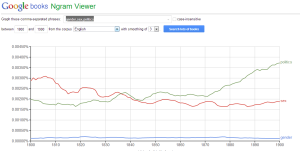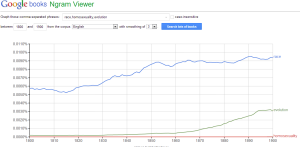Ngram 1- Gender, sex, politics
Ngram 2- Race, homosexuality, evolution
Referencing the Branch Collective website, I chose these terms after looking at their topic clusters page. I mostly focused on their identity section, pulling words such as gender, sex, race, homosexuality. I added politics and evolution because I thought it seemed relevant, given that talking about gender and sex is often taken into a political context, and since they are fairly controversial topics I also added in evolution. As you can see from these Ngram charts, as I expected, gender and homosexuality are barely mentioned in literature during this time period. Also evolution was very low on the chart until about 1870 which makes sense because it was around that time Darwin started publishing his theories. I find it interesting that during the early 1800’s sex was mentioned more than politics, and then in the 1830’s they switch. Clearly politics became more important/popular to write about than sex. Race is mentioned pretty heavily all throughout this period and is on the incline. As time goes on, especially in literature today, I would expect almost all of these words to increase.
Google Ngram definitely helps to see trends in literature during specific time periods, but as the blog post by Ted Underwood explains, it really doesn’t give much context. Although we know that race was talked about frequently during this time period, we have no idea how it was being talked about. Similarly with the word sex. Was it so high because Google books has a lot of erotic novels from this time period? We have no idea what type of books they are taking from to make these charts.
I do like the visualization aspect about these charts, but once again this information can’t stand alone and we need to look further to find more context for the words.

